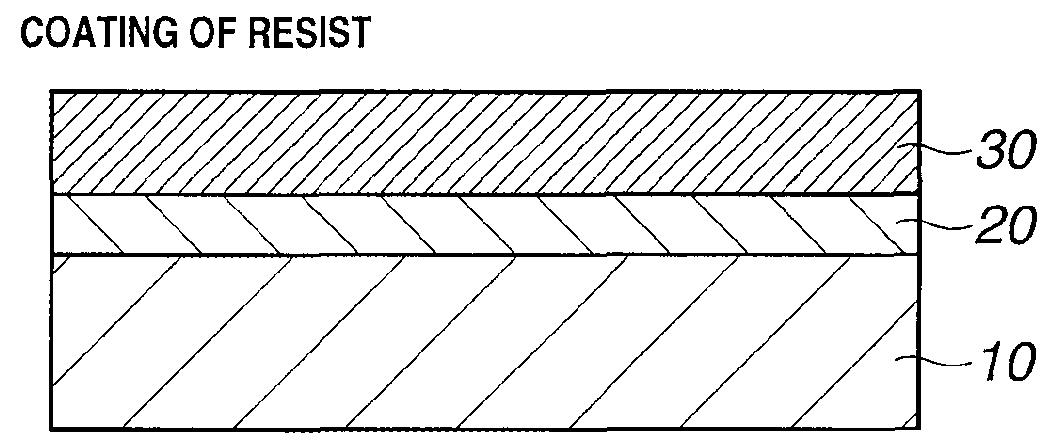Pattern forming process and shrink agent
a technology of shrink agent and pattern forming process, which is applied in the field of pattern forming process, can solve the problems of failing to reduce the dimensional variation of resist pattern,
- Summary
- Abstract
- Description
- Claims
- Application Information
AI Technical Summary
Benefits of technology
Problems solved by technology
Method used
Image
Examples
synthesis example 1
[0089]Polymers (for use in shrink agent and resist composition) were synthesized by combining suitable monomers in tetrahydrofuran solvent, effecting copolymerization reaction, crystallizing from methanol, repeatedly washing with hexane, isolation and drying. There were obtained random copolymers, designated Polymers 1 to 8, Blend Polymer 1, Comparative Polymers 1, 2, Resist Polymer 1, and Water-repellent Polymer 1. The polymers were analyzed for composition by 1H-NMR spectroscopy and for Mw and Mw / Mn by GPC. The polymers are identified below with their analytical data.
Polymer 1
[0090]Mw=65,000
[0091]Mw / Mn=2.22
[0092]
Polymer 2
[0093]Mw=96,000
[0094]Mw / Mn=2.10
[0095]
Polymer 3
[0096]Mw=26,000
[0097]Mw / Mn=1.84
[0098]
Polymer 4
[0099]Mw=19,300
[0100]Mw / Mn=1.94
[0101]
Polymer 5
[0102]Mw=23,000
[0103]Mw / Mn=1.97
[0104]
Polymer 6
[0105]Mw=12,300
[0106]Mw / Mn=1.79
[0107]
Polymer 7
[0108]Mw=9,900
[0109]Mw / Mn=1.97
[0110]
Polymer 8
[0111]Mw=36,500
[0112]Mw / Mn=1.76
[0113]
Blend Polymer 1
[0114]Mw=36,500
[0115]Mw / Mn=1.76
[0116]
Co...
synthesis example 2
[0129]As the polymer for use in shrink agent, Block Copolymer 1 was prepared by RAFT polymerization. In a nitrogen atmosphere, 2.1 g of styrene, 0.15 g of 2-cyano-2-propyl benzodithioate, and 0.04 g of 2,2′-azobisisobutyronitrile were dissolved in 11 g of methyl ethyl ketone. In the nitrogen atmosphere, the solution was stirred at 80° C. for 4 hours. Subsequently, a solution of 3.1 g of 2-(dimethylamino)ethyl methacrylate in 3 g of methyl ethyl ketone was added dropwise to the reaction solution, which was stirred at 80° C. for a further 4 hours. The polymerization solution was cooled to room temperature and added dropwise to 300 g of hexane. The precipitated solid matter was collected by filtration, washed with 120 g of hexane, and vacuum dried at 60° C. for 15 hours, yielding Block Copolymer 1 as identified below.
Block Copolymer 1
[0130]Mw=26,000
[0131]Mw / Mn=1.20
[0132]
PUM
| Property | Measurement | Unit |
|---|---|---|
| thickness | aaaaa | aaaaa |
| thickness loss | aaaaa | aaaaa |
| dispersity | aaaaa | aaaaa |
Abstract
Description
Claims
Application Information
 Login to View More
Login to View More - R&D
- Intellectual Property
- Life Sciences
- Materials
- Tech Scout
- Unparalleled Data Quality
- Higher Quality Content
- 60% Fewer Hallucinations
Browse by: Latest US Patents, China's latest patents, Technical Efficacy Thesaurus, Application Domain, Technology Topic, Popular Technical Reports.
© 2025 PatSnap. All rights reserved.Legal|Privacy policy|Modern Slavery Act Transparency Statement|Sitemap|About US| Contact US: help@patsnap.com



